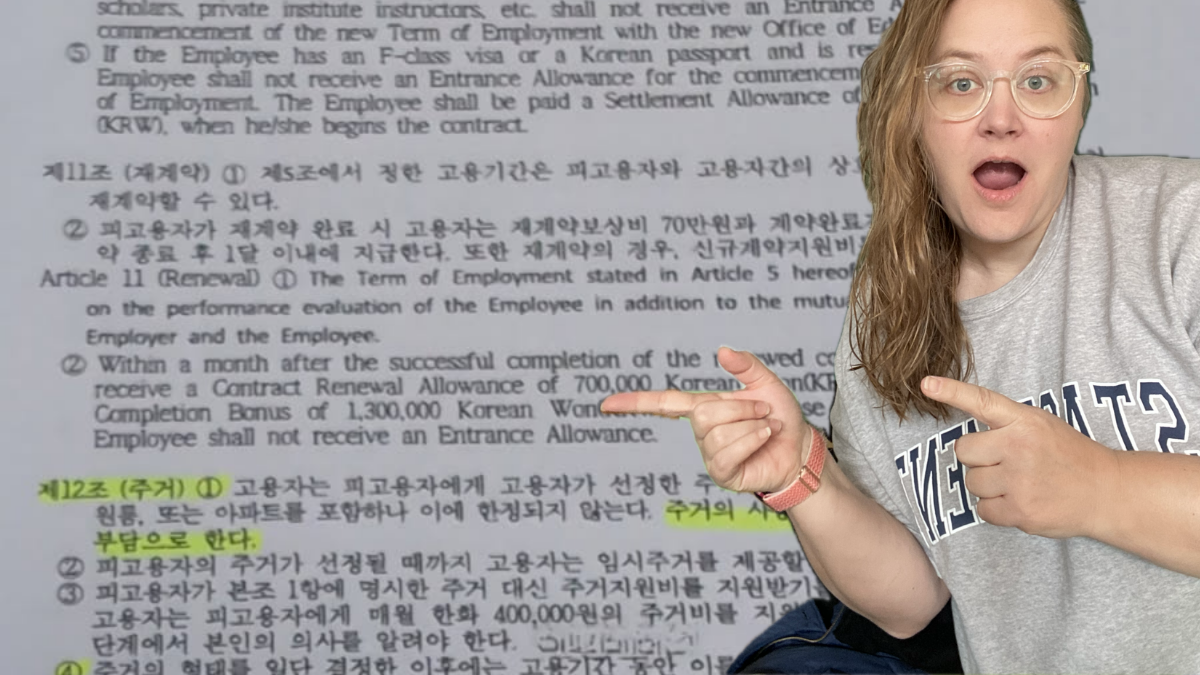
Korean Severance Pay and Contract Renewal Bonus Info
Do you understand the differences between your Severance Pay and the Contract Renewal Bonus (Also referred to as the Contract Renewal Allowance) when you work as a foreign ESL Teacher in public schools in South Korea? We’ve met people who get these conflated, so it’s time to take a closer look.
About Severance v. Contract Renewal
Severance pay (퇴직금) and a contract renewal bonus (재계약 보너스) are two completely different things in South Korea. They are different in three primary ways: 1) definition & purpose, 2) legal basis, and 3) taxation. We asked ChatGPT to organize our research into some easy-to-understand charts to create a clear breakdown so you can better advocate for yourself and your finances:
1. Definition & Purpose
Over the years, we have regularly seen Severance Pay and contract Renewal Bonuses conflated in conversations, so we want to first establish how the definitions and purpose differ:
| Item | Severance Pay (퇴직금) | Contract Renewal Bonus (재계약 보너스) |
|---|---|---|
| What is it? | An optional incentive is offered for agreeing to extend your contract | Upon signing or starting the renewed contract (varies by workplace). Sometimes, they may split it between signing and completing the contract instead of as just one payment. |
| Purpose | Post-employment benefit to support financial transition or retirement | Motivational bonus to retain employees |
| Who decides it? | Mandated by law (근로기준법 Article 34) | Decided by the employer; not legally required |
| When is it paid? | After contract ends (resignation, termination, or completion) | After the contract ends (resignation, termination, or completion) |
| Eligibility | Any employee who works 12+ continuous months | Only if the employer offers it; usually for good performance |
2. Legal Status
Now that you better understand their differences, we need to point out the biggest difference of them all. They have completely different legal implications and obligations:
- Severance Pay = Legal entitlement
- Protected under Korean labor law (Article 20)
- Must be paid if you meet the 1-year rule
- Cannot be waived or replaced with a bonus
- Contract Renewal Bonus = Optional and negotiable
- No legal obligation to offer or pay
- Amount, timing, and conditions vary widely. Please pay attention to this. You can’t assume how this will be paid or that it will be paid out the same way each year.
- Can be canceled if the employee violates contract terms
3. Taxation Differences
Finally, you need to know they will have different tax implications as well:
| Income Type | Taxed as Wage Income? | Notes |
|---|---|---|
| Severance Pay | ✅ Yes, but taxed at a reduced rate due to retirement income exemptions | Lower income tax burden |
| Contract Renewal Bonus | ✅ Yes, taxed like regular monthly wages | Full income tax and social insurance deductions apply. This means you may have a larger tax payment around the time your contract renews. This can be a suprise for many people. |
Can one replace the other?
❌ No.
Some employers try to label a “bonus” as severance to avoid future payments. This is illegal.
💬 Example: If your boss says, “We’re paying your severance monthly as a bonus,” that’s likely a red flag unless:
- It’s properly reported and taxed as a 퇴직연금 (retirement pension)
- And you can access it through a certified pension institution
Common Amounts
From what we have experienced in our 15 years in Korea, the range of payouts for foreign ESL teachers working in the public school system is as follows:
| Category | Common Range |
|---|---|
| Severance Pay | 1 month’s average salary per year worked |
| Contract Renewal Bonus | ₩500,000 to ₩2,000,000 (varies by employer and performance) |
What to Prepare Before Contacting Help
- Your employment contract
- Pay stubs or bank transfers
- KakaoTalk or email conversations with your employer
- Your ARC (Alien Registration Card) and passport
- Dates of employment and resignation
Where to Find Legal Help
In South Korea, there are official government agencies, legal aid services, and non-governmental organizations that foreigners can contact for help with labor issues like unpaid severance (퇴직금). Here’s a structured list:
Ministry of Employment and Labor (고용노동부)
Many consider the best official contact for labor rights violations, including:
- Unpaid severance
- Wrongful dismissal
- Illegal contract terms
Contact Them:
When contacting anyone about your labor issues remember that you need to have evidence and the ability to clearly outline your situation. For best results, carefully prepare your information:
- Call 1350 (then press 4 for English support)
- Hours: Mon–Fri, 9am–6pm
- https://www.moel.go.kr/english
Labor Counseling Center for Foreign Workers (외국인근로자지원센터)
This organization offers Multilingual labor counseling (Korean, English, Chinese, Vietnamese, etc.) They also have locations across the country. They can often offer help with:
- Labor law explanation
- Help filing complaints
- Mediation between the employer and the employee
Korea Legal Aid Corporation (대한법률구조공단)
Offers free or low-cost legal advice and representation for:
- Unpaid wages
- Severance disputes
- Contract issues
Contact Them:
- 132 (Korean only, but you can visit in person for English help)
- https://www.klac.or.kr/ (Only partially available in English)
Local Support Centers for Foreigners (외국인 주민지원센터)
Communities across South Korea may offer local centers that provide international residents with:
- Labor issue referrals
- Help understanding contracts
- Language assistance
Community Groups
Please note that the foreign support groups for legal matters often offer incomplete or inaccurate information. Use these groups with caution and understand that, as well-intentioned as they might be, they often don’t offer great advice due to their lack of awareness regarding nuance.
Additional Reading Regarding Severance Pay
You may also find these Severance Pay blog posts helpful.

Founded in 2015, the South of Seoul team consists of volunteers on three continents working together to support English-speaking people traveling or living in South Korea. South of Seoul volunteers work with organizations and individuals across South Korea to improve equitable access to information across South Korea. Much of South of Seoul’s information focuses on Pyeongtaek, Gyeonggi-do, South Korea.
Blogs published under the authorship of “South of Seoul” include blogs compiled by multiple volunteers to improve access to standardized information unrelated to individualized personal experiences.





